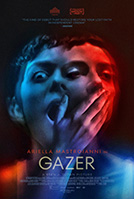Gazer

| Original title: | Gazer |
| Director: | Ryan J. Sloan |
| Release: | Cinema |
| Running time: | 114 minutes |
| Release date: | 04 april 2025 |
| Rating: |
Mulder's Review
Ryan J. Sloan's debut feature Gazer is a cinematic journey that boldly explores the interweaving of time and perception through its protagonist Frankie, played by Ariella Mastroianni. The film is a bold exploration of dyschronometry, a rare neurological disorder that distorts the perception of time. Ryan J. Sloan, making his directorial debut, brings this abstract concept to life, creating a compelling visual and thematic narrative.
Drawing on Gilles Deleuze's theories in Cinema 2: The Time Image, Ryan J. Sloan's narrative echoes the philosopher's ideas on cinema's relationship with time. Like Deleuze's observation that montage provides the dimension of time in cinema, Gazer uses a disjointed, fragmented narrative to immerse the audience in Frankie's distorted reality. The film's structure and editing choices, which reflect the protagonist's fractured perception, recall the cinematic delirium found in classics like Vertigo and Memento.
From the very first moments, Gazer demands the viewer's attention, urging them to focus on every detail - an invitation that sets the tone for the film's meticulous construction. The grainy 16mm film, shaky handheld camera and grainy textures all contribute to the film's unsettling atmosphere, anchoring the viewer in Frankie's unstable world. This stylistic choice reinforces not only the film's aesthetic, but also its connection with its protagonist, allowing the audience to feel his sense of disorientation directly.
The film's soundscape is equally evocative, with Steve Matthew Carter's saxophone-rich score amplifying the tension and underscoring Frankie's inner turmoil. The auditory experience fluctuates according to his moods, whether it's the recordings of his daughter or the hum of a support group's voices. These sound choices are integral to the audience's immersion in Frankie's mental state, blurring the boundaries between reality and hallucination.
Ariella Mastroianni delivers an outstanding performance as Frankie, portraying a woman on the verge of mental and emotional collapse. Her portrayal of a mother desperate to reconnect with her daughter, while battling an illness that leaves her uncertain of the passage of time, is both raw and relatable. Mastroianni's performance is the foundation of the film, bringing a human element to the midst of an abstract, surreal narrative.
However, while Gazer excels in its stylistic execution and conceptual audacity, it falters in its final act. The story, which is carefully paced and rich in suspense, loses momentum as it approaches its conclusion. The series of convoluted revelations and the disappointing resolution leave the viewer with a feeling of unfinished business.
The film's attempt to fuse its various mysteries - Frankie's past, Paige's disappearance and the overall critique of Big Pharma - into a coherent whole falls short, resulting in a finale that seems more abstract than satisfying. Despite these shortcomings, Gazer remains a compelling, thought-provoking debut. It's a film that challenges traditional narrative structures, embracing ambiguity and inviting audiences to question the reliability of on-screen testimony. The film's imperfections, rather than detracting from its impact, underscore Sloan and Mastroianni's potential as emerging voices of independent cinema.
Gazer isn't just a film about time - it's a meditation on the fragility of human perception and the limits we're willing to cross to regain control of our own lives. In this sense, Sloan's debut is a promising one, pointing to a bright future for the director and his collaborators. The film's unique take on neurodivergence and its inventive use of cinematic form make it a striking entry in the canon of psychological thrillers. Even if it doesn't achieve all its ambitions, Gazer is a bold and inventive work that leaves a lasting impression.
Gazer
Directed by Ryan J. Sloan
Produced by Ryan J. Sloan & Ariella Mastroianni
Written by Ryan J. Sloan & Ariella Mastroianni
Starring Ariella Mastroianni, Marcia Debonis, Renee Gagner, Jack Alberts, Tommy Kang
Music: Steve Matthew Carter
Director of photography: Matheus Bastos
Editing: Ryan J. Sloan & Jordan Toussaint
Production companies: Telstar Films
Distributed by: Metrograph Pictures (United States), UFO Distribution (France)
Release date: April 4, 2025 (United States), April 25, 2025 (France)
Running time: 114 minutes
Seen on September 10, 2024 at the Deauville International Center
Mulder's Mark:

